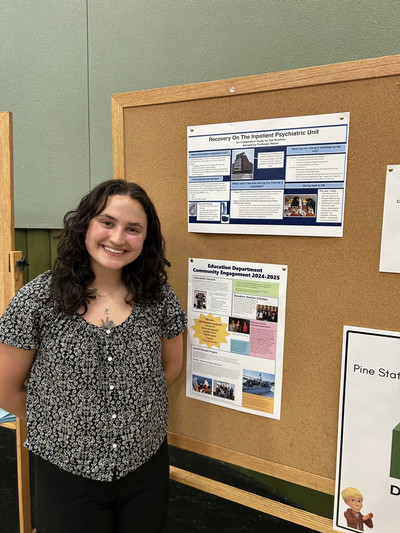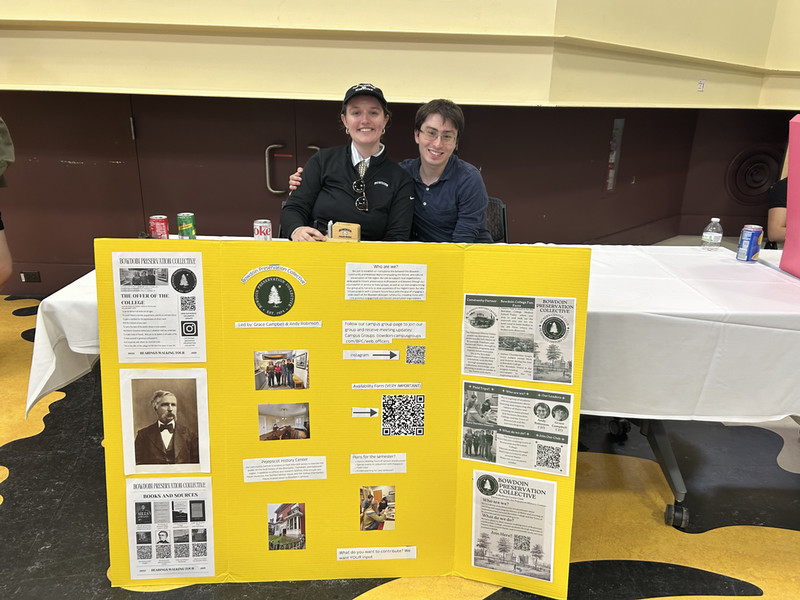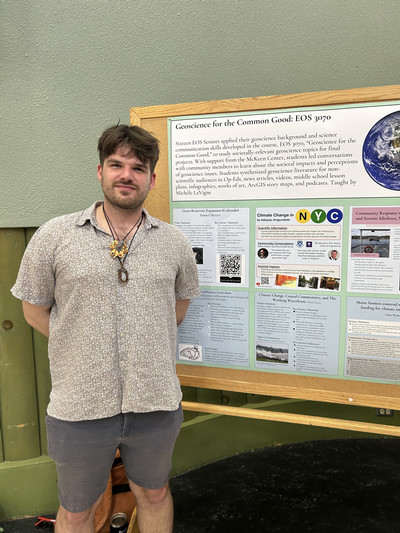The Common Good from All Angles
By Tom Porter“It’s an annual event celebrating work done by student volunteers,” said Sarah Seames, director of the McKeen Center for the Common Good, whose programs were all highlighted at the symposium.
“It’s a great place for students to learn about the programs of the McKeen Center, and for those who have been involved to reflect on their experiences, whether that was taking part in first-year orientation trips, alternative spring break initiatives, or any other volunteering opportunities we offer. We also invite academic departments, Bowdoin athletics, the Bowdoin store, CXD, and other offices to share what they do in work that relates to the common good. They are all featured here too,” she added. In all, said Seames, more than a hundred posters were on display.
Here’s a sample:

Zoe Buettner ’25 was showcasing her independent, year-long study, titled “Recovery on the Inpatient Psychiatric Unit,” advised by Associate Professor of Psychology Hannah Reese.
The most rewarding aspect of the project, she said, was learning how to interact with and show respect and kindness for people with severe mental illnesses like schizophrenia and bipolar disorder.
“Their conditions are characterized by a distorted sense of reality that's different from what you or I might be experiencing,” explained the psychology major. The challenge is to be able to have a conversation with someone who’s going through this, “to show compassion and see them as a human being beyond their diagnosis.”
Buettner, who plans to pursue a career in health care, completed over a hundred volunteer hours at the Maine Medical Center in Portland for this project. “It was a great way,” she said, “to combine my studies with my health care ambitions.”

Campbell (L) and Robinson share a love of local history
“Grace Campbell ’27 and her classmate Andy Robinson were representing the Bowdoin Preservation Collective, a local history educational initiative they formed last year as part of the McKeen Center’s Bowdoin Volunteer Corps. Campbell and Robinson founded the club to celebrate and explore Bowdoin’s rich history and its significance to the state of Maine and beyond, recognizing a meaningful opportunity to bring this perspective to campus.
“This is something we're both really passionate about,” said Robinson, who is majoring in history and government. “Grace is particularly interested in Joshua Chamberlain and Civil War history, among other things, and I love lighthouses and local history.”
“We aim to get students more involved with Maine’s history and learn more about the place they’re living in,” explained history and archaeology major Campbell, who said the group has taken students on fun field trips to places like the Maine Maritime Museum and the Maine State Archives (“we saw the Maine Constitution—with the word ‘commonwealth’ crossed out—a Native American treaty, and some pretty cool maps.”)
Next fall, the collective is putting on an exhibit on the third floor of the Hawthorne-Longfellow Library, with the help of special collections and archives. They’re planning to revamp the Joshua Chamberlain display and mount their own mini-exhibit.

Henry Zucco ’27 titled his project “Climate Change, Coastal Communities, and the Working Waterfront.”
He is one of sixteen seniors in Associate Professor of Earth and Oceanographic Science Michèle LaVigne’s class Geoscience for the Common Good (EOS 3070) looking at societal problems from a geoscience perspective for their final projects.
Zucco said the goal of his project was to look at the impact of the major storms that wreaked havoc on Maine coastal communities in January 2024. “I wanted to better understand how the effects of climate change are directly impacting the working waterfront communities and how they're managing it.” Zucco undertook a series of conversations with various community members, including a fishing industry advocate, the harbormaster for Harpswell, and the head of an environmental consulting firm.
The overwhelming consensus, he said, is that these “once in a hundred years” storms are becoming more frequent, and coastal communities need more investment to prepare for them. “Whether that means funded grant programs, available government resources, or private money, these mostly small businesses and town-run piers and wharves need help to adapt in such a way that they can handle the battering.” A lot of engineering work and structural reinforcement is needed if the same level of damage is to be avoided, said Zucco, who will be publishing an op-ed this summer in a local newspaper about his findings.



“It ought always to be remembered, that literary institutions are founded and endowed for the common good, and not for the private advantage of those who resort to them for education. ”
—Joseph McKeen, Bowdoin President, 1802